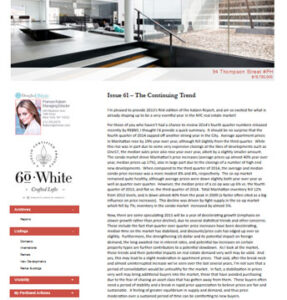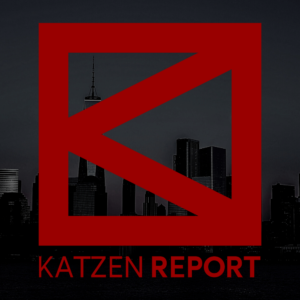I’m pleased to provide 2015’s first edition of the Katzen Report, and am so excited for what is already shaping up to be a very eventful year in the NYC real estate market!
For those of you who haven’t had a chance to review 2014’s fourth quarter numbers released recently by REBNY, I thought I’d provide a quick summary. It should be no surprise that the fourth quarter of 2014 capped off another strong year in the City. Average apartment prices in Manhattan rose by 19% year over year, although fell slightly from the third quarter. While this rise was in part due to some very expensive closings at the likes of developments such as One57, the median sales price also rose year over year, albeit by a slightly smaller amount. The condo market drove Manhattan’s price increases (average prices up almost 40% year over year, median prices up 17%), also in large part due to the closings of a number of high end new developments. When compared to the third quarter of 2014, the average and median condo price increase was a more modest 8% and 4%, respectively. The co-op market remained quite healthy, although average prices were down slightly both year over year as well as quarter over quarter. However, the median price of a co-op was up 6% vs. the fourth quarter of 2013, and flat vs. the third quarter of 2014. Total Manhattan inventory fell 12% from 2013 levels, and is down almost 40% from the peak in 2009 (a factor often cited as a big influence on price increases). This decline was driven by tight supply in the co-op market which fell by 7%; inventory in the condo market increased by almost 5%.
Now, there are some speculating 2015 will be a year of decelerating growth (emphasis on slower growth rather than price decline), due to several statistical trends and other concerns. These include the fact that quarter over quarter price increases have been decelerating, median time on the market has stabilized, and discounts/price cuts has edged up ever so slightly. Furthermore, the strengthening US dollar and its potential impact on foreign demand, the long awaited rise in interest rates, and potential tax increases on certain property types are further contributors to a potential slowdown. As I look at the market, these trends and their potential impacts on real estate demand very well may be valid. And yes, this may lead to a slight moderation in apartment prices. That said, after the break neck and almost uninterrupted increase we’ve seen over the last several years, I’m not sure that a period of consolidation would be unhealthy for the market. In fact, a stabilization in prices very well may bring additional buyers into the market, those that have avoided purchasing due to the fear of chasing an asset class that has gotten away from them. These buyers often need a period of stability and a break in rapid price appreciation to believe prices are fair and sustainable. A feeling of greater equilibrium in supply and demand, and thus price moderation over a sustained period of time can be comforting to new buyers.
As it relates to foreign purchasers, I am interested to see how this plays out. Yes, the purchasing powers of the foreign buyer community (particularly Europe) has eroded, and I’m sure you’ve read the headlines regarding this potential impact on the super luxury market in particular. While this certainly is a possibility, I think there is an argument to take the other side of this debate. While purchasing power may have declined, the fear of further currency and economic deterioration outside the US coupled with the historical performance of (dollar denominated) NYC real estate may only increase the appeal of property in the City. Therefore, while the foreign community may be able to afford less on the margin, the appeal of NYC as a desired asset class may actually rise. In addition, let’s not lose sight of the wave of competing high end product that is hitting the market; it’s only natural to expect there to be a digestion period particularly in light of the aforementioned factors. With more choice, and massive price appreciation, buyers will want to see everything before committing. I think to expect the last two years to be the norm is a little unrealistic.
Finally, on the topic of interest rates, this has been a concern for months (if not years). While this will have the biggest impact on intermediate price points given the high end sector more often is “all cash” purchases, it is logical to fear an impact on prices across the board should rates rise materially. While it’s always hard to handicap rate hikes, it’s interesting to see a growing sentiment in the financial community that Federal Reserve rate increases may be farther out/more modest in size than previously thought. With the strengthening dollar, modest US economic growth, low inflation, and accommodative policies of other central banks, this growing view may prove correct. Just look at the 30-year Treasury, it reached all-time lows just last week. At least over the near term, this bodes quite well for mortgage rates.
Time will tell how 2015 unfolds, but price predictions aside, I would expect a busy and healthy state of affairs in the months ahead.

